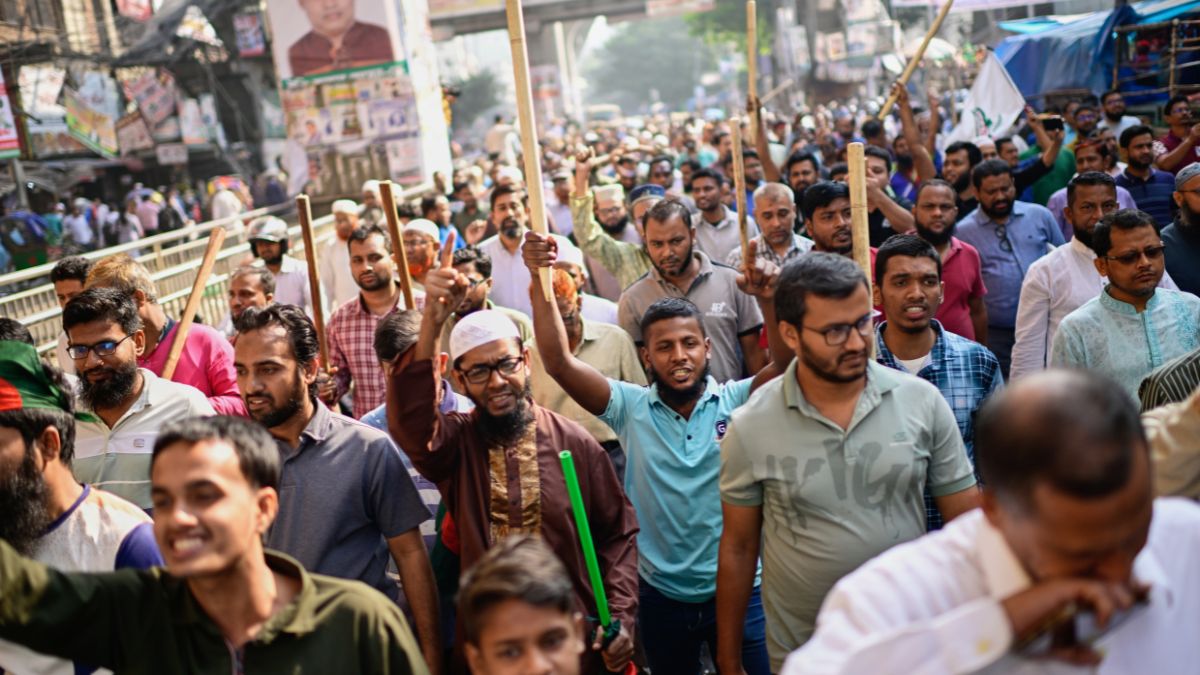Classes and transport services across Bangladesh were severely disrupted on Thursday as ousted Prime Minister Sheikh Hasina and her now-banned Awami League party called for a nationwide “lockdown” to protest her ongoing trial over last year’s deadly student-led uprising.
Hasina faces charges of crimes against humanity for allegedly ordering a crackdown on the protests that brought an end to her 15-year rule in August 2024. She has been living in exile in India since her ouster and has not appeared publicly or online.
A special tribunal in Dhaka is expected to deliver its verdict against Hasina on Monday, chief prosecutor Tajul Islam announced at a press conference on Thursday.
The Awami League urged its supporters to take to the streets, while the current government and opposition groups pledged to prevent demonstrations. As a result, schools and universities in Dhaka and other major cities shifted to online classes and exams, while public transport came to a near standstill amid tight security.
The capital’s normally congested roads were largely deserted, and reports of vandalism surfaced throughout the day. In Gopalganj district — Hasina’s ancestral home and traditional stronghold — a government office was targeted with a firebomb. Local media also reported that a Grameen Bank office in eastern Bangladesh was set ablaze on Wednesday.
Quick Reads
View AllInterim leader Muhammad Yunus, the Nobel Peace Prize laureate and founder of Grameen Bank, addressed the nation on Thursday, announcing that a referendum on a new national charter would be held alongside the next parliamentary elections scheduled for February. The date of the vote has yet to be confirmed.
Yunus said the referendum would seek approval for a two-tier parliamentary system outlined in the “July National Charter,” adopted by his interim administration soon after he assumed office on August 8, 2024, three days after Hasina’s fall. He reiterated his government’s commitment to ensuring Hasina faces justice.
Political violence has escalated in recent days. Over the past three days, Dhaka and other cities have witnessed multiple arson attacks and crude bomb explosions. On Wednesday, a train and a bus were set ablaze in the capital, and earlier that day, crude bombs exploded on the Dhaka University campus.
By Thursday morning, soldiers and other security forces had been deployed to guard the special tribunal, which is also trying former Home Minister Asaduzzaman Khan and ex-Police Chief Chowdhury Abdullah Al-Mamun.
Al-Mamun, who turned state witness after pleading guilty, was brought to the court under tight security, while Khan is believed to be in India. Both are being tried in absentia alongside Hasina, though prosecutors have not sought any punishment for Al-Mamun.
Hasina’s ouster followed weeks of violent unrest that left hundreds dead. The interim government has promised elections in February, but the Awami League has vowed to boycott them if barred from participating, claiming that thousands of its supporters have been detained nationwide.
Chief prosecutor Islam has sought the death penalty for Hasina, calling her the “mastermind and principal architect” of the atrocities committed during last year’s uprising.
The Awami League has called the tribunal a “kangaroo court.” Hasina has not appointed a lawyer and denounced the appointment of a lawyer by the state to represent her.
Up to 1,400 people may have been killed in the violence, according to a United Nations report in February. The country’s health adviser under the interim government said more than 800 people were killed and about 14,000 were injured.
Hasina disputed the figures and demanded an independent investigation.
Many Indian outlets published interviews with Hasina in recent weeks, all conduced via email. The interviews apparently irked Bangladesh’s current government. Bangladesh’s Ministry of Foreign Affairs on Wednesday summoned Indian Deputy High Commissioner in Dhaka Pawan Badhe to formally convey its concerns over India allowing “fugitive” Hasina to interact with mainstream Indian media.
Hasina in her interviews accused Yunus of backing Islamists and violating human and political rights, especially of supporters of her banned party. Hasina’s son, Sajeeb Wazed, told The Associated Press on Wednesday that only an inclusive election could stabilize the country.
With inputs from agencies
)